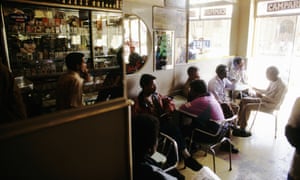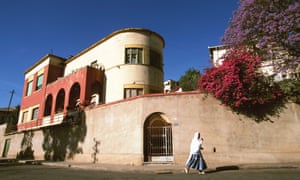Kemal and Mohammed have never met, but until recently their lives were typical of a peaceful, comfortable existence in middle-class Eritrea.
Idyllic childhood evenings were spent playing football in the winding, sun-swept streets of the capital, Asmara. As they got older, they passed time sipping coffee or eating pisseti – mini pizzas – in the art deco cafes that dot the city, or at popular cinemas built when Eritrea was an Italian colony. Then came university, and eventually jobs as civil servants, following in the footsteps of their parents.
But a wild diversion in their lives this year provides a glimpse into two sides of life in Eritrea, one the world’s most secretive, closed-off states.
A 500-page United Nations report released in June describes a country where the government wields absolute power through an extensive surveillance network, torture, forced disappearances and indefinite military service. State control is so pervasive that one citizen said: “When I am in Eritrea, I feel that I cannot even think because I am afraid that people can read my thoughts.”
The figures are disputed, but the UN says up to 5,000 Eritreans flee each month. The EU’s border agency says the number of Eritreans reaching its shores tripled to some 35,000 last year – although some warn numbers may be inflated by migrants who claim to be Eritrean to improve their chances of gaining asylum.
Aged 33 and 26 respectively, Kemal and Mohammed recently joined the exodus, but together their stories paint a complex picture: Kemal left to pursue business opportunities in South Sudan, while Mohammed’s journey to Sudan marked the end of a harrowing few months of imprisonment and torture.
Their stories tell differing but interlinked accounts about conditions in the country today – a topic of fierce debate that divides the growing Eritrean diaspora, with many keen to defend the regime.
Thanks to the 30-year war with Ethiopia for independence, the country’s government is closely tied to the fight for freedom. Both men say the older generation – at home and abroad – are more likely to be staunchly loyal to the government while a newer, younger movement has begun to agitate to for change.
 Men in a cafe in Asmara. Much of the city’s architecture was built by Italian colonisers in the 1930s. Photograph: Ed Kashi/Corbis
Men in a cafe in Asmara. Much of the city’s architecture was built by Italian colonisers in the 1930s. Photograph: Ed Kashi/Corbis
‘I wish to return’
Kemal’s story differs from that of most Eritrean exiles. He says his time doing compulsory national service was uneventful, working for a few months as a civil servant in the capital, and avoiding the hard labour and indefinite service that others have described.
His only brushes with the authorities came during trips to the countryside when soldiers at the checkpoints surrounding the city would ask to see his identity card.
He says that since leaving his mountain-top home for Juba – South Sudan’s scruffy capital nestled in the Nile Valley – he has missed the daily pleasures of his home city, such as walking to work on palm-lined streets as the cathedral bells rang out.
"A large percentage will tolerate the politics as long as the economy is growing" Richard Reid, professor
“Downtown Asmara – it’s full of beautiful things; the cafeterias, the smell of fresh roasted coffee in the mornings,” says Kemal, who is planning a return home later this year.
Rather than political pressure, it was Eritrea’s crumbling economy that forced Kemal out. Crippling UN sanctions have been in place since 2009 following reports that the government, led by president Isaias Afwerki, was training the Somali Islamist group al-Shabaab, an allegation it strongly denies.
Despite a recent surge in foreign mining activity which has reportedly contributed millions in revenue for the government, Eritrea is still ranked as one of the poorest countries in the world. The regime has repeatedly rejected hundreds of millions of aid dollars, claiming it would turn Eritrea into another “spoon-fed” African nation.
“Every Eritrean isn’t necessarily clamouring for elections,” said Richard Reid, a professor specialising in the country, where he lived for a decade and periodically returns to. “There’s a large percentage who will tolerate the politics as long as the economy is growing.”

A ban on carrying foreign currency has seen a thriving black market spring up, with exchange rates vastly out of kilter with official values. This, in turn, has hit businesses hard in a country that imports almost everything.
“I left Eritrea for business purposes. The system there couldn’t provide us work, so I chose to work somewhere else,” says Kemal, who also runs a small business on the side. “Here in South Sudan it’s much better.”
It says a lot about the situation in Eritrea that South Sudan, itself teetering on the brink of economic collapse, is seen as a better business prospect.
Repression
Mohammed’s decisions were shaped by entirely different motives. Money wasn’t the problem – he had long been used to doing small jobs on the side to boost his 700 nakfa ($66) a month salary as a civil servant.
But in May this year, his life changed. One evening he was standing outside a ministry building after work, using its Wi-Fi network to connect to the internet on his phone. “It was almost getting dark when I noticed two young men passing close to me. Sometime later, they came again from a different direction.” The third time, the men stopped in front of him and confronted him directly: what exactly was he doing?
Panicked, Mohammed told them he lived in the neighbourhood. The men threatened to take him to prison, without telling him why. “I guess someone living in one of the houses close to the office must have seen me and reported me to them,” he said.
Over the next few weeks Mohammed’s apprehension grew as he frequently noticed the same two men when travelling to work, or loitering outside his family home. He feared it was because he had so far avoided being conscripted for compulsory military service.
The programme has been labelled as modern-day slavery by some rights groups, and a former diplomat said conscripts are often used to carry out back-breaking work for infrastructure programmes.
A government spokesperson did not respond to requests for comment, but Eritrea has repeatedly dismissed claims of rights abuses.

“Although a person may … be at real risk of mistreatment or inhuman and degrading treatment as a result of the conditions of military service, it cannot be said that every single person [is at risk],” the Home Office noted in a March 2015 report.
Still, a telling clue about the fear which conscription provokes in many people comes in the next sentence: “The application of any such harm or mistreatment appears to be arbitrary.”
Mohammed and two friends decided it was time to make the dangerous trek to Sudan rather than risk being conscripted.
But decades of struggle and skirmishes with neighbours have resulted in a tightly guarded border, and they were soon captured by men in uniform. The soldiers stripped them of their money and phones. When they forced them to take off their shoes, Mohammed assumed it was to prevent them from escaping – but worse was to come.
The soldiers said they were taking them to Hashferay. Later, he says he was glad he did not realise then that they were referring to the notorious prison where thousands of Eritreans are said to be held.
When the shackled prisoners were dragged out of the truck they found themselves in front of a series of rocky mountains dotted with thorny acacia trees. Situated near the town of Haqaz, their cells were underground. By day they carried water and moved rocks for construction projects, or worked on farms in the sweltering heat. Meals were bread and water twice a day. At night, they slept crowded together “like matchsticks”, Mohammed said.
Escape was impossible: without shoes, rocks and thorns pierced their feet, making travel by foot out of the question. Guards would sometimes punish people by forcing them to run around the thorn-strewn ground beneath the trees.
By the time Mohammed was transferred to a military training camp in the north-eastern city of Nakfa three months later, he had seen enough. One night he and another friend escaped under cover of darkness and spent several weeks journeying to Sudan.
“If I had stayed in Eritrea, everything there would have started to seem normal,” said Mohammed, who worries about his family members still back at home.
“I had to do this to be free.”
